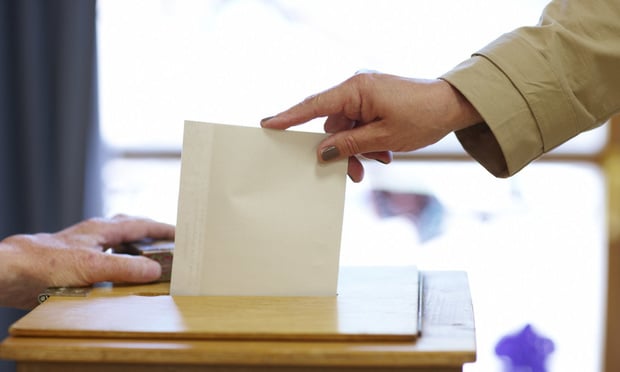Marsy's Law Will Be on Nov. 5 Ballot—but Votes Won't Be Tallied Until Legal Fight Ends
In a historic ruling, a Commonwealth Court judge has decided that Pennsylvania voters will have an opportunity to weigh in on a controversial ballot question Nov. 5, but the votes won't be calculated unless and until the question is determined to be constitutional.
October 30, 2019 at 05:21 PM
5 minute read
 Photo: Christian Schwier
Photo: Christian Schwier
In a historic ruling, a Commonwealth Court judge has decided that Pennsylvania voters will have an opportunity to weigh in on a controversial ballot question Nov. 5, but the votes won't be calculated unless and until the question is determined to be constitutional.
Pa.R.A.P. 1532—Pennsylvania's version of what is known nationally as "Marsy's Law" or the Victims' Rights Amendment—would amend Article I, Section 9 of the state constitution. The measure would create a long list of new rights for victims of crimes and those impacted by crimes, including the rights "to be treated with fairness and respect for the victim's safety, dignity and privacy; to have the safety of the victim and the victim's family considered in fixing the amount of bail and release conditions for the accused; to reasonable and timely notice of and to be present at all public proceedings involving the criminal or delinquent conduct; to be notified of any pretrial disposition of the case; with the exception of grand jury proceedings, to be heard in any proceeding where a right of the victim is implicated, including, but not limited to, release, plea, sentencing, disposition, parole and pardon."
On Wednesday, Judge Ellen Ceisler granted a petition for a preliminary injunction by the League of Women Voters of Pennsylvania and Lorraine Haw, a Pennsylvania voter whose brother was murdered and whose son is serving a life sentence without the possibility of parole. The petitioners argued that the amendment, if approved, would immediately and irreparably hinder criminal defense attorneys' ability to represent their clients and would throw the entire criminal justice system, including the courts, into disarray.
The ruling went against Acting Secretary of the Commonwealth Kathy Boockvar, who argued that delaying the certification of the vote could disincentivize some voters from showing up to the polls at all. Boockvar also argued that because the proposed amendment states that a victim "'shall have the following rights, as further provided and as defined by the General Assembly,'" it's not clear that the amendment would go into effect immediately upon being approved by voters.
But Ceisler said the petitioners met their burden of showing that a preliminary injunction was necessary to avoid immediate and irreparable harm.
"The remedy provided will temporarily enjoin the secretary from tabulating and certifying the votes on the proposed amendment," Ceisler said. "Upon final resolution of the petition for review, the proposed amendment will be declared either constitutional or unconstitutional. If deemed constitutional, the secretary will tabulate and certify the votes."
Boockvar also pointed to the costs incurred by the Department of State for publication of the proposed amendment as another argument against the injunction, but Ceisler waved it off.
"If the proposed amendment is approved by the majority of the electorate, the proposed amendment will immediately become part of our constitution," Ceisler said. "No vote would go uncounted. If the proposed amendment is declared unconstitutional, the secretary would have been mandated to incur the costs regardless."
Ceisler acknowledged that such a remedy is exceedingly rare, "as it appears that delaying certification of the votes to a constitutional amendment has never occurred."
But the judge said the petitioners raised substantial questions about the constitutionality of the proposed amendment.
"If passed, the proposed amendment would immediately and irreparably hamstring defendants' rights to have full and effective investigations carried out on their behalf," Ceisler said. "By invoking their absolute right 'to be treated with fairness and respect for the victim's safety, dignity and privacy,' victims and witnesses (in the likely scenario they are directly impacted by the crime) would stymie the accused's constitutional rights to confront witnesses through cross-examination or to enforce subpoenas compelling their cooperation in criminal proceedings."
Ceisler said she also found persuasive the petitioners' argument that the proposed amendment infringes on the court's ability to prescribe rules governing the practice, procedure and conduct of all courts.
"First, a victim asserting the constitutional privacy right could demand closed proceedings, contrary to Article I, Section 11′s requirement that the courts be open to all," Ceisler said. "Second, the proposed amendment gives victims the right to participate and be heard at all stages of the criminal justice process. This court previously identified the issues that the proposed amendment would have on the day it becomes part of the constitution. As the courts may not abridge, enlarge or modify the substantive rights of any litigant, the proposed amendment could impose on the courts' ability to maintain its calendar in an efficient and expeditious manner."
The petitioners were represented by Mary Catherine Roper and Andrew Chapman Christy of the American Civil Liberties Union of Pennsylvania, along with Steven Bizar and Tiffany Engsell of Dechert.
Reggie Shuford, executive director of the American Civil Liberties Union of Pennsylvania, said in a press release that Ceisler's decision "reaffirms the importance of following the constitution."
"Despite the heated rhetoric, rather than help crime victims, the Legislature failed them in this process," Shuford said. "They did not hold a single hearing over two legislative sessions, and they ignored the law in proposing this massive constitutional amendment. They knew better, and they should have done better."
Bizar said in the release: "From the start, this case has not been about victims' rights, but about protecting the rights of Pennsylvania voters. That is what our clients are concerned about here. When constitutional requirements are skirted, even for good reasons, every one of us suffers."
The Pennsylvania Department of State could not be reached for comment.
This content has been archived. It is available through our partners, LexisNexis® and Bloomberg Law.
To view this content, please continue to their sites.
Not a Lexis Subscriber?
Subscribe Now
Not a Bloomberg Law Subscriber?
Subscribe Now
NOT FOR REPRINT
© 2025 ALM Global, LLC, All Rights Reserved. Request academic re-use from www.copyright.com. All other uses, submit a request to [email protected]. For more information visit Asset & Logo Licensing.
You Might Like
View All


Pa. Superior Court Rules Pizza Chain Liable for Franchisee Driver's Crash
4 minute read
Trending Stories
- 1NJ Jury Awards $4.5M After Woman Trips on Carpet
- 2Blake Lively Is Sued by Texas Crisis Specialist in Latest 'It Ends With Us' Lawsuit
- 3Pa. High Court to Decide Whether Flight in a High Crime Area Can Result in an Investigative Stop
- 4EB-5 Immigration Investor Program: a Win-Win Program, or Is It?
- 5People in the News—Feb. 6, 2025—Unruh Turner, Fox Rothschild
Who Got The Work
J. Brugh Lower of Gibbons has entered an appearance for industrial equipment supplier Devco Corporation in a pending trademark infringement lawsuit. The suit, accusing the defendant of selling knock-off Graco products, was filed Dec. 18 in New Jersey District Court by Rivkin Radler on behalf of Graco Inc. and Graco Minnesota. The case, assigned to U.S. District Judge Zahid N. Quraishi, is 3:24-cv-11294, Graco Inc. et al v. Devco Corporation.
Who Got The Work
Rebecca Maller-Stein and Kent A. Yalowitz of Arnold & Porter Kaye Scholer have entered their appearances for Hanaco Venture Capital and its executives, Lior Prosor and David Frankel, in a pending securities lawsuit. The action, filed on Dec. 24 in New York Southern District Court by Zell, Aron & Co. on behalf of Goldeneye Advisors, accuses the defendants of negligently and fraudulently managing the plaintiff's $1 million investment. The case, assigned to U.S. District Judge Vernon S. Broderick, is 1:24-cv-09918, Goldeneye Advisors, LLC v. Hanaco Venture Capital, Ltd. et al.
Who Got The Work
Attorneys from A&O Shearman has stepped in as defense counsel for Toronto-Dominion Bank and other defendants in a pending securities class action. The suit, filed Dec. 11 in New York Southern District Court by Bleichmar Fonti & Auld, accuses the defendants of concealing the bank's 'pervasive' deficiencies in regards to its compliance with the Bank Secrecy Act and the quality of its anti-money laundering controls. The case, assigned to U.S. District Judge Arun Subramanian, is 1:24-cv-09445, Gonzalez v. The Toronto-Dominion Bank et al.
Who Got The Work
Crown Castle International, a Pennsylvania company providing shared communications infrastructure, has turned to Luke D. Wolf of Gordon Rees Scully Mansukhani to fend off a pending breach-of-contract lawsuit. The court action, filed Nov. 25 in Michigan Eastern District Court by Hooper Hathaway PC on behalf of The Town Residences LLC, accuses Crown Castle of failing to transfer approximately $30,000 in utility payments from T-Mobile in breach of a roof-top lease and assignment agreement. The case, assigned to U.S. District Judge Susan K. Declercq, is 2:24-cv-13131, The Town Residences LLC v. T-Mobile US, Inc. et al.
Who Got The Work
Wilfred P. Coronato and Daniel M. Schwartz of McCarter & English have stepped in as defense counsel to Electrolux Home Products Inc. in a pending product liability lawsuit. The court action, filed Nov. 26 in New York Eastern District Court by Poulos Lopiccolo PC and Nagel Rice LLP on behalf of David Stern, alleges that the defendant's refrigerators’ drawers and shelving repeatedly break and fall apart within months after purchase. The case, assigned to U.S. District Judge Joan M. Azrack, is 2:24-cv-08204, Stern v. Electrolux Home Products, Inc.
Featured Firms
Law Offices of Gary Martin Hays & Associates, P.C.
(470) 294-1674
Law Offices of Mark E. Salomone
(857) 444-6468
Smith & Hassler
(713) 739-1250





